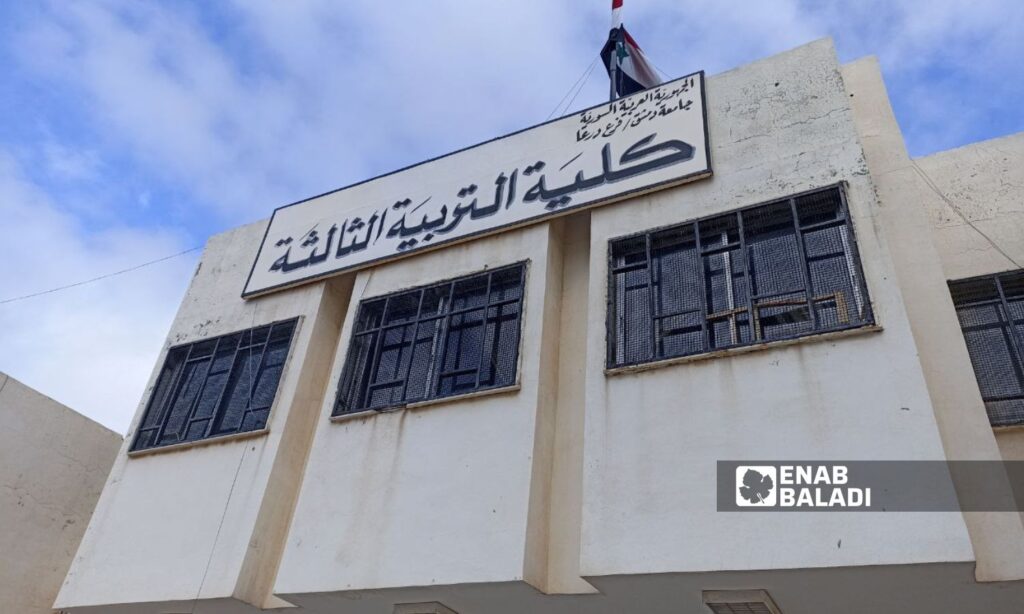Daraa – Halim Muhammad
Students at the College of Psychological Counseling in the Daraa governorate branch of Damascus University complained about the absence of English and French language teachers for more than two years.
Some of them told Enab Baladi that the absence of language teachers is an additional problem alongside others that start with overcrowding in classrooms and end with the lack of loudspeakers, which hinders students’ understanding of the lectures.
Mohammad Abdul Rahman, a freshman at the College of Psychological Counseling, told Enab Baladi that he was not satisfied with the English language course offered last February, only to find out later that he had failed it.
Abdul Rahman attributed his failure in English to not having received any lectures during the first semester due to the absence of a teacher for the course.
His attempts to catch up through private tutoring have not helped him understand the subject matter, and he could not cover the curriculum sent to him via social networking sites due to its vast size.
Abdul Rahman stated that the English course failure rate exceeds 90%, according to his observation of the results lists at the college.
Students of Psychological Counseling are supposed to take two courses in either English or French, depending on the student’s enrollment, but students are struggling with both languages due to a two-year absence of teachers.
The head of Damascus University’s Daraa branch told the government newspaper Tishreen last February that Daraa’s colleges are experiencing a shortage of English and French language teachers, including veterinary medicine and sciences faculties.
He added that the university had announced job openings for the technical staff and would announce competitions for teaching assistants and faculty members in the future, which are expected to supply the necessary staff to Daraa’s colleges.
Inadequate alternatives
Mohammad Abdul Rahman and some of his peers resorted to private lessons with a specialized English teacher in Daraa as an alternative to the absence of university teachers. However, these solutions proved costly for most of them.
The cost of a single session per student amounts to 5000 Syrian pounds per hour. However, the students discontinued after attending five sessions due to their inability to comprehend the course material from the underqualified teacher, according to Abdul Rahman.
Abdul Rahman added that the teacher who taught them the curriculum was a high school teacher and not familiar with university curricula, and that the examination questions are set by the course teacher at the university, who naturally is absent.
He further explained that attending the course at university with a teacher simplifies understanding the curriculum and knowing which lectures the teacher emphasizes, and the teacher may omit some chapters from the course.
The burden is even greater for students enrolled in French, as it is rare to find a French language teacher in Daraa, and the number of students studying the language is smaller compared to the number of Psychological Counseling students enrolled in English.
Among the students who decided to study French was Ahmad, who withheld his full name for security reasons. He is a senior whose graduation depends on passing French courses, which he has repeatedly failed.
Ahmad told Enab Baladi that his graduation has been on hold for two years due to failing the French courses.
Qassem, another freshman in the College of Psychological Counseling, told Enab Baladi that the lectures taught at Damascus University are sent in file format through groups of first-year students on the WhatsApp platform.
He added that the files require a modern mobile phone capable of opening them, noting that his phone does not enable him to access these files, leading him to copy and photograph them on paper, with the printing cost of a single sheet being 500 Syrian pounds.
The Daraa branch of Damascus University comprises six faculties: Education, Economics, Veterinary Medicine, Science, Arts, and Law. According to the government newspaper Tishreen, the number of students in Daraa’s colleges reaches 16 thousand.
Temporary alternatives
When the Muzayrib colleges went out of service in 2013 (all college branches in Daraa except for the College of Education), it led to a crisis that forced the University administration to find solutions by using the Hospitality School as a temporary alternative, as well as the Banking Institute and the Sharia Secondary School. According to students interviewed by Enab Baladi, these venues are not serviceably qualified to be alternatives but have become permanent locations.
After the regime’s control over the southern region in 2018, the Ministry of Higher Education did not work on renovating the Muzayrib colleges, which turned into rubble after their equipment was stolen, and even their buildings became debris.
In 2018, technical committees affiliated with Damascus University estimated the cost of rehabilitating the Muzayrib colleges to be over one billion Syrian pounds when the exchange rate was 450 Syrian pounds per dollar. The cost has multiplied many times after the exchange rates reached 14,000 Syrian pounds per dollar, according to the S-P Today website, which specializes in monitoring global currency exchange rates.
In addition to the above, the building at that time was still standing, whereas now it needs to be rebuilt from scratch.











